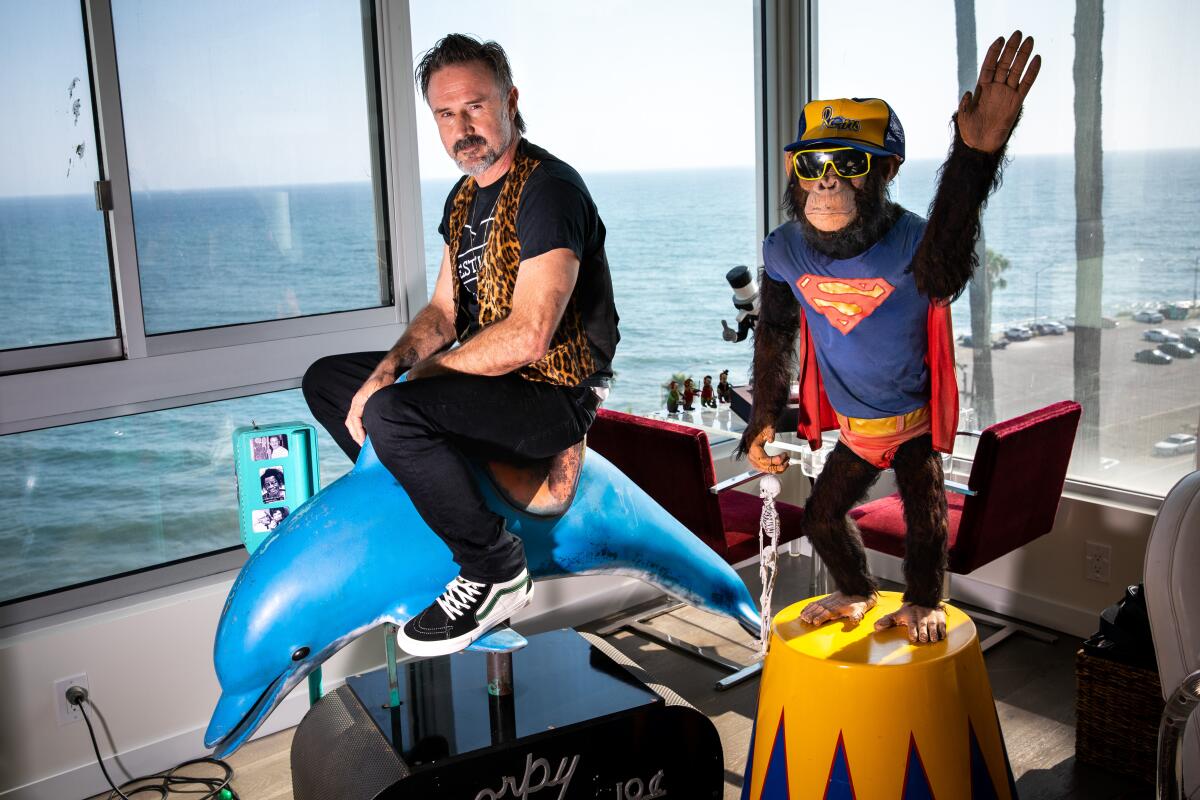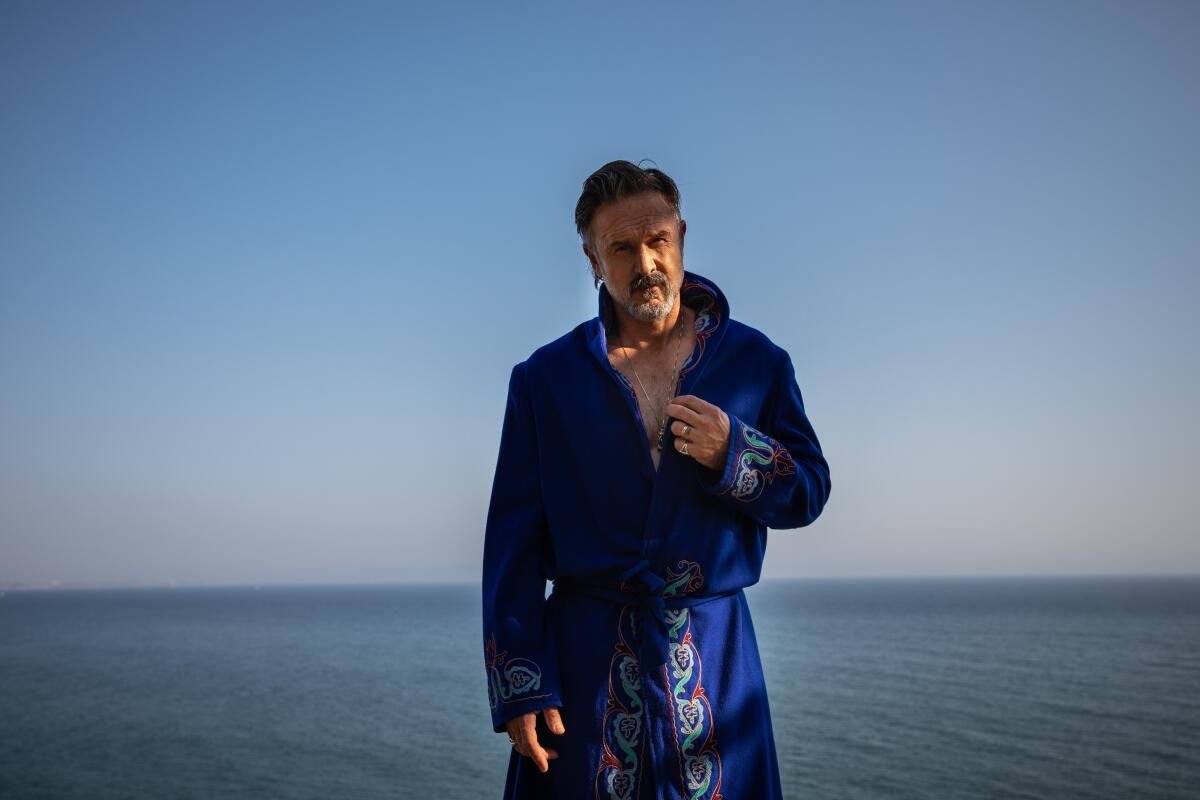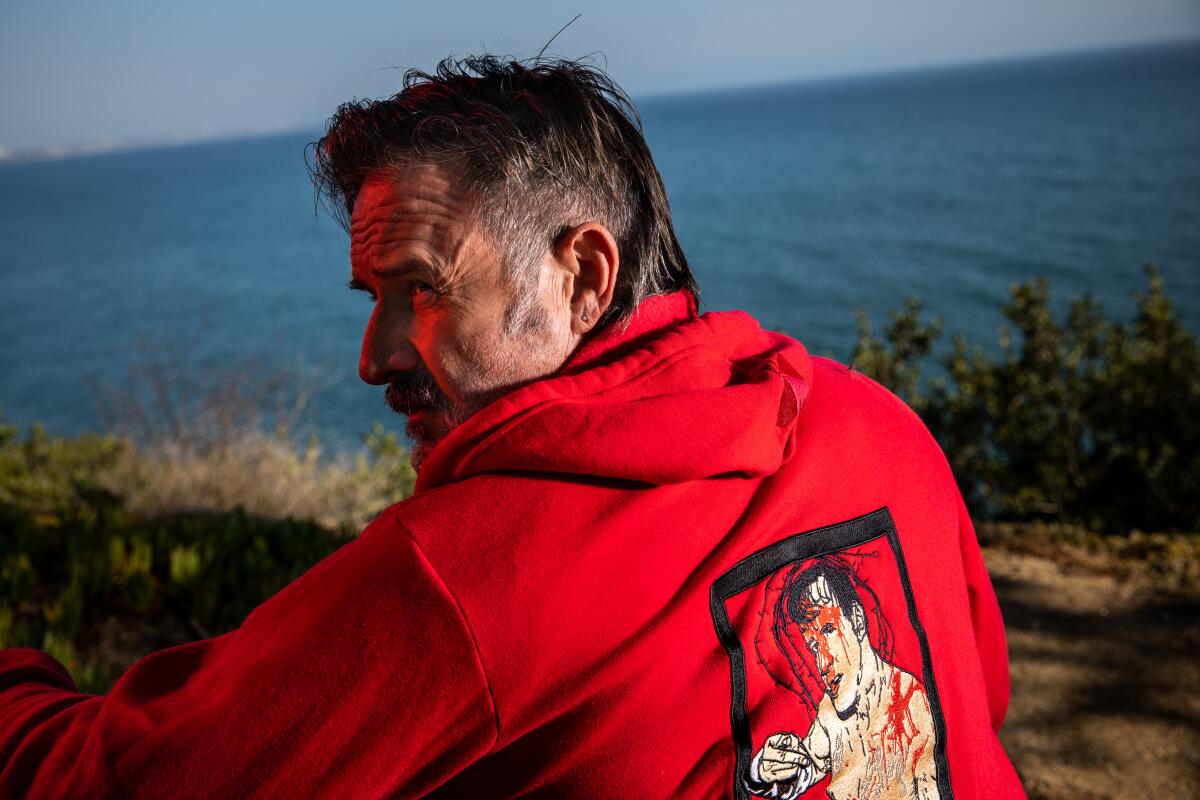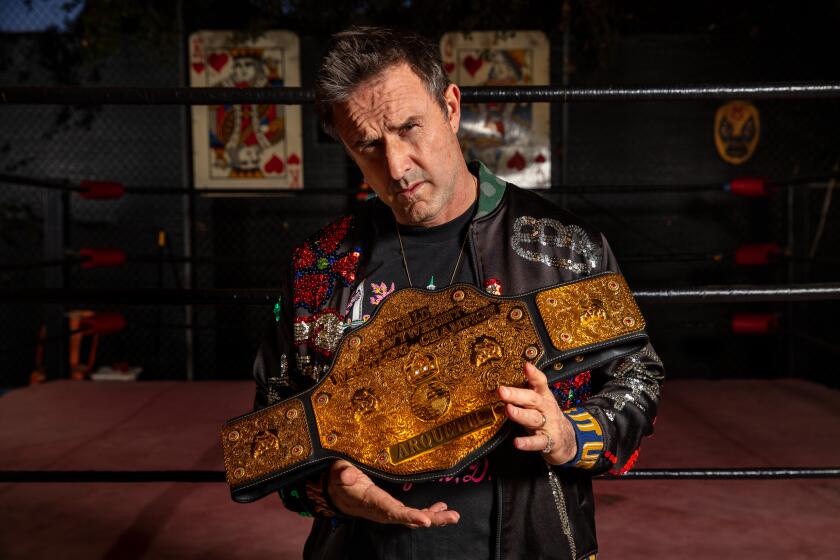Q&A: Why David Arquette chased his pro wrestling redemption to the brink of death

It was an act of wrestling sacrilege: While promoting his 2000 movie “Ready to Rumble,” David Arquette won the WCW World Heavyweight Championship in a stunt that would be reviled for decades by those who take professional wrestling — and the blood, sweat, talent and training that go into it — seriously.
The “Scream” actor’s WCW championship win is still regarded as one of the worst moments in pro wrestling, and that’s saying something in a sport that saw Donald Trump inducted into the WWE Hall of Fame.
Eighteen years later, after a whirlwind ascent on the indie pro circuit, Arquette found himself being rushed to the hospital bleeding severely from the neck after a hardcore wrestling deathmatch gone wrong.
His need to prove himself, he admits, nearly cost him his life.
“One of the things people were saying about me was that I wasn’t tough. I was like, ‘Oh, I’m tough. I’m also crazy,’” Arquette said last week over Skype. “I just went too far with it.”
“You Cannot Kill David Arquette,” a documentary about his efforts to earn real ring respect, explains why, decades after the wrestling world turned against him, the rejection still stung for the lifelong wrestling fan. The blow was twofold; soon afterward, Hollywood stopped taking him seriously too.
He’s acted steadily in indie films nonetheless, appearing most recently in the August release “Spree.” Upcoming projects include the horror comedy “12 Hour Shift” and “Ghosts of the Ozarks” with Tim Blake Nelson, both of which he and wife Christina McLarty Arquette also produced.
See photos from the backyard screening of the David Arquette wrestling doc that was set to premiere at SXSW before the cancellation due to the coronavirus.
But a few years ago, after undergoing heart surgery in his mid-40s, Arquette became fixated on redeeming his name in wrestling and becoming a wrestler himself. With documentary cameras rolling, he pursued a legitimate run in a sport in which most fans openly hate him, this time playing the role of the accidental heel — wrestling-speak for the bad guy — yearning for acceptance.
Produced by McLarty Arquette, executive produced by Arquette and directed by David Darg and Price James, the documentary is now available via video on demand platforms. It attempts to rewrite his ring narrative from interloper to underdog while also revealing his personal battles with addiction, mental health and career frustrations.
Now 48 and on the other side of the match that almost killed him, Arquette is still processing what pushed him to such extremes in the first place — and not quite ready to announce his retirement from wrestling.
He spoke to the Times from his home in Los Angeles; this conversation has been edited for clarity and length.

What did you hope people would learn from this documentary when you began filming?
I wanted to make it a love letter to wrestling and a bridge from Hollywood to wrestling. I also wanted to understand wrestling for myself, to really see why people got so mad [in 2000]. I also learned that in what I was doing , there was an element — especially what led me to the deathmatch — that I’d been beating myself up for so long.
There’s all this stuff you learn in wrestling about self-confidence and determination, having to power through the ongoing pain, having to get up and get to another town. The strain it puts on relationships. Showing up and the hotel room’s not there that’s supposed to be. Some people are really sweet, some people are really shady … it is a microcosm of life.
It taught me a lot about time, because time in the ring goes fast. One of the main things you have to learn is how to slow it down but be completely present. Even in the middle of a match you’re remembering how to work together, how to sell, how to play to the crowd and improvise, all these things.
How do you look back on the journey now, given that it all happened not too long ago?
Life’s a roller coaster. I’m good now. It’s hard to stay calm and anxiety-free, but it did capture this moment in time when I was figuring out a lot of these things. Believe it or not, throughout this pandemic it’s been ... not peaceful, because there’s always craziness going on, and obviously drinking’s a huge problem for me so when I don’t drink, my life is better.
That’s one of many struggles you’re very open about in the film.
Even this is just a glimpse of me. I feel weird when I talk about this stuff, but I also feel weird not talking about it. I don’t like hiding, I don’t like secrets, I don’t like people that are mean. I try to be open and kind to people. Sometimes it leads to good things, and sometimes you get yourself into trouble.
[In] what I was doing there, there was an element — especially what led me to the deathmatch — that I’d been beating myself up for so long.
— David Arquette
This movie begs the question: Hated as he’s been in the world of wrestling, could David Arquette ever truly be a heel?
I turned heel briefly so Jerry “The King” Lawler could give me a piledriver! King Brian Anthony had just destroyed me, and I said, “I’m from Hollywood — you think I love wrestling? I’m just an actor! I’m acting!” I’m walking out of the ring and there’s some 8-year-old kid sitting there in tears like, “I believed in you,” and I was like, “Oh! I’m sorry!” I didn’t know what to do because I find it very hard to be a heel. It’s very difficult.
Kayfabe in wrestling is this veil between reality and fiction protecting the business and its lore — but making a documentary is counter to that idea in many ways. In the film you show the planning of a match. How did you negotiate that line?
There was always a bit of push and pull about the kayfabe of it all. My wife actually kicked me out of the editing room because I was too close to it. I was very protective of the business. We’re protective in other parts of the movie, but that’s the one we reveal because we wanted people to get a better understanding of what wrestling was; even though it’s choreographed, it’s not fake in any regard. We wanted people to feel that they were on the journey with me, like they had stakes in it.
The film shows your willingness not only to throw yourself into the ring but to ink that love on your body. When did you get Randy Savage and Miss Elizabeth tattooed on yourself, for example?
I got that along the journey! Sarah Joy Shockey of “Marty and Sarah Love Wrestling,” they do a great podcast that’s one of my favorites .... I had her do a bunch of them, and I picked those two. I just remembered how much I loved Miss Elizabeth. She was one of the first girls I was in love with. It’s fun when you find talent that you like so much that you get involved in the story line and you stick with it. That’s one of the reasons I went back, because I wasn’t able to really enjoy wrestling. I’d go to matches, and people would be rude to me. I’d lose interest in watching. I feel like I have a better relationship with it now.
So you’re a lifelong wrestling fan, you get the chance to be part of it and then people hate you for the next 20 years. That’s rough.
It does have an effect on your personality. But the only reason those tweets hurt is because they tap into something you’ve been telling yourself, that you’re not good enough or you’re not this or that. And you fall into this dark pit of, “woe is me,” but it’s important not to listen to that voice and to believe in yourself. That’s what I’m trying to do.
You had your infamous WCW run in 2000. In 2010 you were powerbombed through a table during a promo appearance on WWE’s “Raw.” Almost another decade later you hit the indie circuit. How has your relationship with wrestling evolved in that time?
I was like the kid from “Ready to Rumble,” that’s what I loved about the script. I was a fan like that: I screamed too loud at the matches, I really felt it. I’d always wanted to be part of WWE, so to be able to go in 2010 was really an honor. This whole thing has been just wanting to be one of the guys. It always feels terrible to be an outcast, to be not accepted.
In Hollywood there are the cool kids and you get invited and then you stop getting invited. People have you on their shows and then nobody wants you. It’s like, “What did I do?” A big lesson was also to love yourself and who cares what people think, or who cares if you’re even included? But it’s kind of hard to get there sometimes.
Hollywood has never quite known what to do with anyone from the world of wrestling with the exception of, like, Dwayne “The Rock” Johnson. How would you change that?
My dream plan would be to work with WWE or AEW and get like $10 million for a series of independent films or even TV shows. All of these talents have their amazing toolboxes. When you grow up as a wrestler you’re your own travel agent, your own manager, your own merch person, your own insurance, your own everything, so if you can get a bunch of people and get them all in [the Screen Actors Guild] … in the process you can make all these fun movies. I would love to do something like that.
Who are some wrestlers you think should have acting careers?
Oh man, everyone! The Nasty Boys, those two guys as characters in films would be incredible. Booker T, DDP should do more acting. Stone Cold Steve Austin and Ric Flair are just like, duh. Kurt Angle should have a whole acting career, he’s hilarious. He should be the next Leslie Nielsen. I’d love to see Bret Hart play a Ray Donovan-type character. All these guys would be incredible actors. They understand the subtleties of what a closeup can bring.
In the film your career frustrations are attributed to being typecast as a goofball. Why did you decide to return to the role of Dewey for the upcoming “Scream 5” sequel?
Part of that is that I am a goofball, but I also have a very serious side and can play dramatic roles, so it’s just the shallowness of Hollywood and the way they see things. But I love playing the role, and I love that I’ll be able to work with Courteney [Cox] again, and hopefully Neve [Campbell] comes onboard because she’s really the heart and soul of the franchise.
You also say in the documentary, “I’m sick of being the joke. If you’re part of the joke it’s not as painful as if you are the joke.” Is this a thought that’s been in your head for the last 20 years?
I know all of my humor comes from being self-deprecating. I knew me being out of shape was going to be funny, and I knew I could get there, because as actors we know if we have a project that we have to be a soldier in, we know how to get in shape, we know how to focus on it, if we have enough time ahead of time. But it is a feeling that I have, that I’m constantly having, that’s the voice in my head that I have to constantly challenge and not listen to because it’s also the voice that’ll make me get wasted.
Your time spent with luchadores in Tijuana seems particularly meaningful. What stayed with you the most from that training?
There is such a love for wrestling there. It’s almost religious in a sense where it’s super respected and it’s generational, that’s one of the main things I learned. They throw coins if they like what you did in your match, and I got a couple of those coins, and I carried them with me through all of my other matches. It meant a lot to me.

The GCW deathmatch with Nick Gage is the hardest part of the film to watch. What’s it like for you to revisit that match yourself?
It was scary. I thought I was dying. I even tried to pin him even though I wasn’t supposed to win — I thought, “If I’m dying, I’m dying a winner!” But he kicked out. There’s a lot behind it, a lot that went into it. I don’t want to break too much kayfabe. We have no hard feelings toward each other. He texted me: “You’re cool, bro.” I said, “You’re cool too.” Then I got upset and said, “I’ll fight you anywhere!” But I’m not looking to fight anybody anymore.
Are you retired from wrestling?
I’m not sure if I’m retired. I really enjoy tag team wrestling with RJ [City], and I owe him a talk show, to get him on a late-night talk show .... He’d be an incredible talk show host ... I’d be his Ed McMahon and interview wrestlers and old comedians.
Jack Perry a.k.a. Jungle Boy appears in the film with his father, your friend Luke Perry. Were you close before you started wrestling?
I’ve known [Jack] a long time. I’d seen him throughout the years and then right toward the end we all got to get together before Luke passed, at my house at the backyard wrestling ring. That was a really powerful moment for me, in retrospect, having shared that time with [Luke] not knowing he’d be gone a couple months later.
And they were both there for you the night you got hurt. How did it happen that they were the ones to help you?
Jack was also on the card that night. They both took me to the hospital. Luke was running around like, “Who’s in charge of medical here?” He didn’t know why these cameras were around following [us]. At one point in the car ride, because I knew that my jugular hadn’t been hit, but I didn’t know how bad or where [my wound] was ... at one point I turned back and said, “Well, at least I finally got my first crimson mask!” and nobody laughed. It wasn’t very funny at all. It was actually something I was kind of proud of; that’s when you get the whole bloody face. But nobody laughed. It was like telling a joke at a funeral.
The doc doesn’t show much of the immediate aftermath of the deathmatch and your injury. What were your family’s reactions?
They freaked out. They all came to the hospital and were concerned for my life. Rosanna [Arquette] was filming me while I was unconscious to show it back to me like, “Don’t ever do this again!” They were really scared in general that I’d get very hurt and then I got very hurt. But wrestling’s an incredibly dangerous sport. You really need to train with it. Tommy Dreamer wrote me after and said, “Never work with glass or fire, you can’t control it.” That was really eye-opening for me.
Was taking your love for wrestling to this extreme degree ultimately a positive thing for you?
Yeah. It’s something I needed to do to question, “Why are you beating yourself up so much? Why are you risking your life this way?” And to answer that question I needed to experience it.
And did you find the wrestling redemption you were looking for?
You’re never going to change everyone’s minds, but I do feel like I gained the respect of a lot of wrestling fans and at least made a mark on it. It was something I just had to do that was bigger than me. It was an adventure I had to cross off my list.
More to Read
Only good movies
Get the Indie Focus newsletter, Mark Olsen's weekly guide to the world of cinema.
You may occasionally receive promotional content from the Los Angeles Times.











